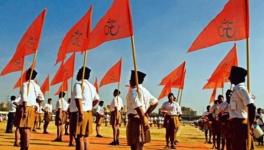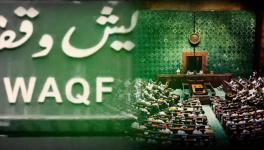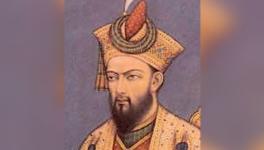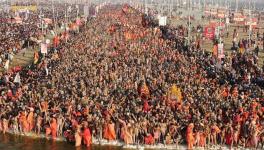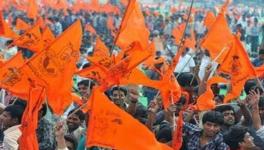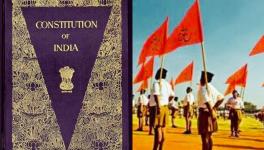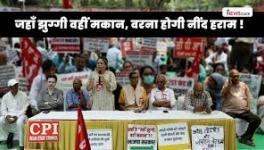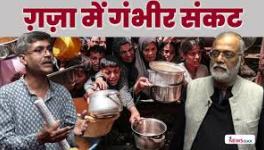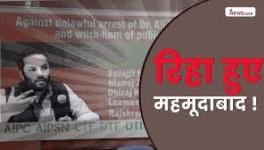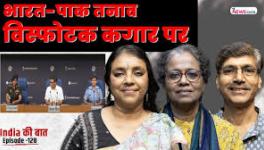Khalistan Calls no Trifle in Punjab, But Hindu Majoritarianism Bigger Threat
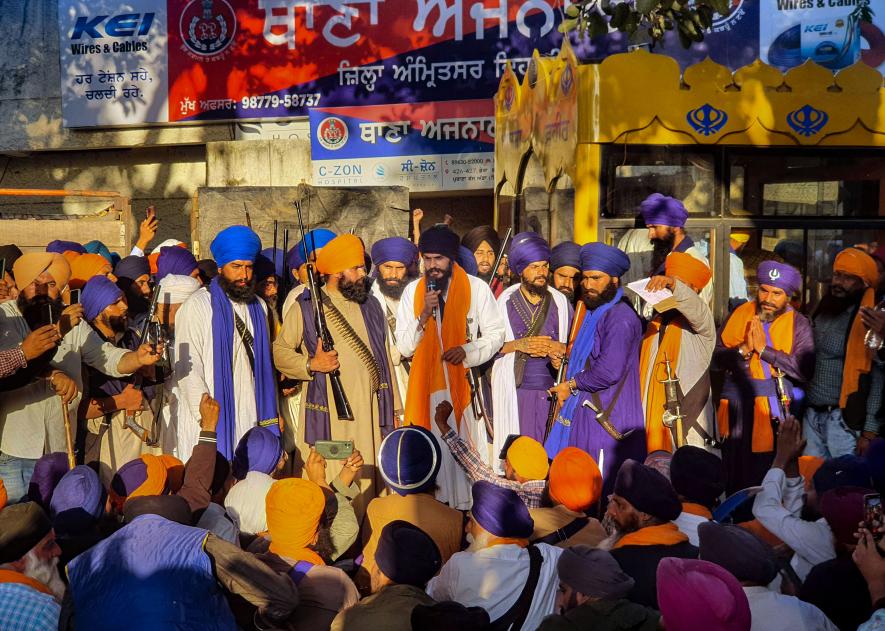
Waris Punjab De' founder Amritpal Singh along with his supporters arrive at the police station demanding release of his associate, at Ajnala near Amritsar, Thursday, Feb. 23, 2023 Image Courtesy: PTI
Amritpal Singh, a 29-year-old self-styled follower and preacher along the lines of Punjab’s ill-famed Jarnail Singh Bhindranwale, is drawing attention from some youthful sections in the State. He has led a vigorous campaign seeking to rekindle the Khalistan demand. He recently made news for a march he led to a police station in Ajnala. His supporters demanded the police release their associate, ‘Toofan’. They carried the Sikh holy text, Guru Granth Sahib, using it as both a weapon and a shield during their siege of the police station, which did not stop until they had forced the release of Toofan.
No Punjabi who has lived through the 1980s would forget the violence, bloodshed and havoc spread across Punjab by Bhindranwale and his uprising for Khalistan. Ultimately, he was killed by State forces, but Amritpal Singh has deployed a new tactic to revive that old rhetoric. He has been saying that if India’s ruling political class does not object to calls to create a Hindu Rashtra, why should the Sikhs not raise a similar demand for Khalistan.
In Amritpal’s reckoning, Khalistan is as essential a demand as Hindu Rashtra, which Hindutva campaigners have been demanding. Notwithstanding its limited appeal among Punjabis, his glib statements expose how divisive ideas can threaten India’s unity and integrity. His statements show how calls for Hindu Rashtra—from multiple Hindutva organisations, alongside calls for the genocide of Muslims—can weaken India.
Target Minorities, Ridicule Secularism
In post-2014 India, Hindutva organisations have repeatedly defined India as primarily a country of the majority Hindu community. Top political leaders controlling the State apparatus deploy Hindu icons, idioms and phrases to polarise society and rewrite history based on religious identity. They do this wilfully to subvert India’s constitutional vision, which, unless anchored in the secularism of multicultural, multi-religious India, will not let it thrive peacefully.
The historian Ram Guha described Hindutva majoritarianism as “unforgiving and unapologetic”. He is correct, for we can see how it can encourage complimentary majoritarianism or revive dormant majoritarianism. When those backed by the State define some provinces, regions, or localities purely based on the religious identity of their residents, is it not fuel to feelings of being excluded? In Punjab, like many other states, many young people are cut off from their past. The culture of impunity and heightened religious intolerance, combined with weakening agrarian culture and economics, partially explain a phenomenon like Amritpal Singh. But these are only part of the explanation. Remember that the media has reported on Amritpal and his handful of supporters in sensational ways—often citing unnamed sources in intelligence agencies as having ‘warned’ or ‘informed’ the State government about the imminent threat. So why has the Centre not taken steps against Amritpal, who returned to India from Dubai last year, even if the State government has failed to do so?
In recent developments, there appears to be a concerted attempt to overwhelm the progressive tendencies of Punjab and its people, which the country saw reflected in the successful farm movement. Punjab may contain those who are inclined toward divisive forces—it is, however, in no mood to revive the torturous 1980s.
Secularism Holds India Together
What holds India together is not a religion but secularism, which is part of the basic structure of the Constitution. The Punjabis have stood for these ideas repeatedly, as during the revocation of the special status of Jammu and Kashmir, when they supported the anti-Citizenship Amendment Act protests, not to mention the public-spirited aid and assistance Sikh and non-Sikh groups from Punjab provided hapless citizens during the devastating COVID-19 crisis. What we are seeing now, in the Amritpal phenomenon, is an effort to subvert that spirit of unity and secularism, to undermine the Constitution, and endanger the unity and integrity of India.
By ridiculing secularism and targeting those who uphold it, the ruling political class is hurting the foundations of Indian republicanism. What if religion, ethnicity, language, creed, or caste, become tools of more competitive nationalistic claims? The more the majority raises religious and ethnic nationalism, the less powerful the idea of India would become.
Freedom Struggle Rejected Hindutva, Embraced Secularism
During the freedom struggle and formative stages of the Indian republic, our leaders rejected the idea of Hindu Rashtra and embraced the secular framework to define and nurture India. In the 1930s, Mahatma Gandhi said there would be no Hindu Raj in India but a People’s Raj. Sardar Patel described the idea of Hindu Rashtra as “mad” and asserted in the Constituent Assembly that secular democracy would guide India’s leaders to fashion its destiny. Dr BR Ambedkar wrote in Pakistan and Partition of India that Hindu Rashtra would be “calamitous” and appealed to all to reject it.
In 1973, three years before the Indira Gandhi government introduced the word secularism in the Preamble of the Constitution, the Supreme Court said in the Kesavananda Bharati case that secularism, among other ideas, was part of the Constitution’s basic structure. Now the dangerous Khalistan rhetoric, justified by referring to the repeated calls for a Hindu Rashtra, must lead us to reaffirm our commitment to secularism. It alone can defeat ideas which run contrary to India’s constitutional vision. Tragically, Prime Minister Narendra Modi and his ministerial colleagues are silent while politics based on religion rears its ugly head in Punjab, a sensitive border State. Their silence is bound to raise speculation about wheels within wheels, but that apart, we must recall 1928, when Ambedkar cautioned that politics in India is nothing but theology in action. He warned that if secular politics took very long to gain traction in Europe, one could imagine how difficult it would be to create similar conditions in India. It is time to remember leaders who provided us a blueprint to take India forward on secular lines.
Danger of Mixing Politics with Religion
Tavleen Singh aptly wrote in The Indian Express newspaper, “It is time that the Prime Minister also noticed that there has been too much mixing of religion with politics on his watch and by his most ardent supporters.” Sadly, she fails to note that the Prime Minister, who should lead by example, himself mixes politics with religion. The question is, can he change?
The author served as Officer on Special Duty to former President of India KR Narayanan. The views are personal.
Get the latest reports & analysis with people's perspective on Protests, movements & deep analytical videos, discussions of the current affairs in your Telegram app. Subscribe to NewsClick's Telegram channel & get Real-Time updates on stories, as they get published on our website.









